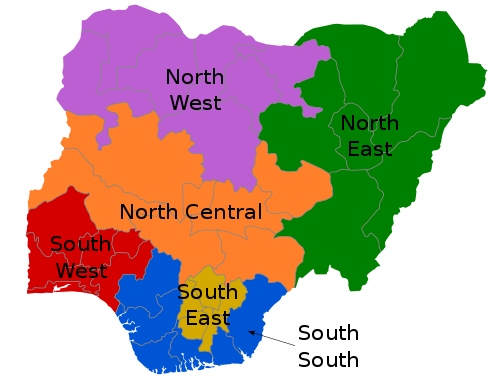The Federal Republic of Nigeria is divided into six geopolitical zones, commonly just called zones. They are a type of administrative division grouping the country's states, created during the regime of president General Sani Abacha. Nigerian economic, political, and educational resources are often shared across the zones.
The six geopolitical zones of Nigeria.
The six zones were not entirely carved out based on geographic location, but rather states with similar ethnic groups, and/or common political history were classified in the same zone.[citation needed] Nigeria is made up of approximately 400 ethnic groups and 450 languages. There was a need for the government to merge similar groups for effective allocation of resources.
source: https://en.m.wikipedia.org/wiki/Geopolitical_zones_of_Nigeria
The political landscape of Nigeria is complex and dynamic, with a wide range of political parties, interest groups, and individuals vying for power and influence. Nigeria operates a federal system of government, with power shared between the federal government and the 36 states.
The country has a multi-party system, with over 50 registered political parties, although the two main parties are the All Progressives Congress (APC) and the People's Democratic Party (PDP). Other significant parties include the All Progressives Grand Alliance (APGA), the Labour Party (LP), and the Social Democratic Party (SDP).
Political power in Nigeria is often based on regional and ethnic affiliations, with different parts of the country having their own political power bases. For example, the southwest is traditionally associated with the Alliance for Democracy (AD) and later the Action Congress (AC), while the southeast is associated with the All Progressives Grand Alliance (APGA).
Interest groups and civil society organizations also play an important role in shaping the political landscape of Nigeria. Labor unions, religious organizations, and student groups have all been involved in political activism and have influenced policy decisions.
Despite the vibrancy of Nigeria's political landscape, the country faces significant challenges in terms of corruption, violence, and the management of ethnic and religious tensions. These issues have often led to political instability and have hampered the country's development. However, there are ongoing efforts to address these challenges and strengthen Nigeria's democratic institutions.

Photo Credit : https://images.app.goo.gl/EQv1DysTswgn21zw7